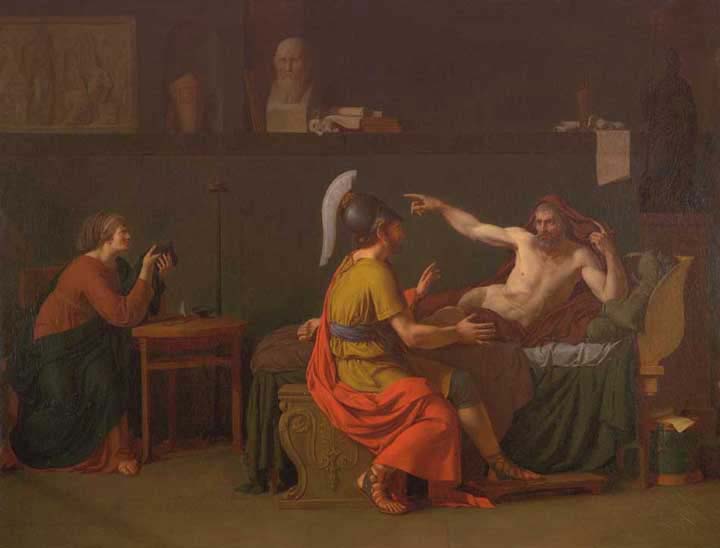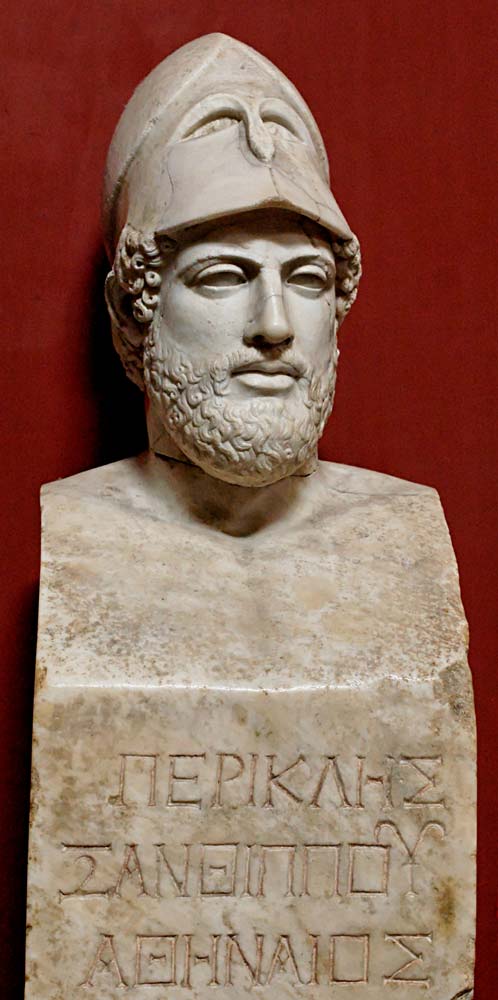| Pericles | |
|---|---|
 |
|
| Greek General of Athens | |
| Born | c. 495 B.C. Athens |
| Died | 429 B.C. Athens |
| Nationality | Greek |
| Military | General (Strategos) |
Pericles (c. 495-429 B.C.) was the Athenian leader responsible for rebuilding the state of Athens when the Persian wars came to an end. He also led Athens during the period of the Peloponnesian War. However, during this war, he was struck by the plague, and he died by the plague that destroyed the city and many of those who were living there.
He was an extremely important leader to the people of Athens during 5 B.C. The period of his life during which he led the Athenian people is today known as the Age of Pericles, because of his legacy, what he did for the city, and what he did for its people.
Family Background
Xanthippus and Agariste were the parents of Pericles. His father was a military leader during the period of the Persian wars, and he was also victorious at the battle of Mycale. Pericles’s mother, Agariste, was from the Alcmeon family, and they were accused of treachery during the Battle of Marathon due to their interference with certain legal matters, and matters during the wartime.
Pericles, Office, and Democracy
 The first office that Pericles held was working in the position of “choregos.” He held this title under the reign of Aeschylus, during 472 B.C. The title that Pericles held means that he not only funded Aeschylus and his entry in to power, but he also backed the political leader and supported him in the competition that was required for the position.
The first office that Pericles held was working in the position of “choregos.” He held this title under the reign of Aeschylus, during 472 B.C. The title that Pericles held means that he not only funded Aeschylus and his entry in to power, but he also backed the political leader and supported him in the competition that was required for the position.
During the 460 B.C. period, the Helots were rebelling against the Spartan powers, and the Spartans requested the assistance from Athens. Cimon, who was Athenian leader at the time, responded to the request from Sparta by leading their troops, and aiding the Spartans.
They fought together in battles that broke out during the years that fighting and rebelling took place with the Helots. The Spartans were victorious, and were able to send the Helots back thanks to the assistance of the Athenians and the democratic government, which the Helots feared.
Upon his return, Cimon was ostracized for his assistance to Sparta, and because he had favored an oligarch society for Athens. Now that democracy was the power and form of government in Athens, Pericles, who was a descendant of Cleisthenes (the founder of democracy at the time), took power, and led Athens in 460 B.C.
Election
 The office for military general leader was elected at around the same period of 460 B.C., and Pericles was elected to the office and held the title of General for a period of 29 years.
The office for military general leader was elected at around the same period of 460 B.C., and Pericles was elected to the office and held the title of General for a period of 29 years.
During the period following the election, from about 458 to 456 B.C., Pericles had the Long Walls built. This structure was built between Piraeus and Athens. Piraeus was a small peninsula, that was located only a few miles from Athens, and the structure connected Athens to this small peninsula.
Construction Projects
Another project that he undertook was building a structure of Athena Promachus, on the Acropolis, on the Parthenon and on the Propylaea. Other temples and other shrines were also built under his rule to commemorate and remember the gods and to replace the statutes and structures that were destroyed during the wars by the Persian armies. The projects that were undertaken and funded by the Treasury of the Delian alliances.
Democracy
One of the biggest contributions that Pericles made during his time in power was paying the magistrates for their work in Athens. Because of Pericles’ decision to pay those who held a position in office, the number of leaders that were elected to office during his time in power was limited. Because payments were made to those in power, the state was only able to pay a certain number of magistrates and leaders, he effectively limited the amount of power and rule in his democracy.
In addition to limiting the number of officers, there was also a limit as to who could run for office. In order to be eligible to hold an office of power, one had to be born of two Athenian parents, and they had to be an Athenian citizen, in order to be eligible to sit in office. If individuals who wanted to hold office had a foreign mother, they were not able to run for a position. Due to the fact that Metic women (the term given to women who were foreigners) produced foreign children, Pericles was not able to marry Aspasia of Miletus (a woman whom he had an affair with), because of the fact that she could not hold office, since she was a foreigner.
Death
Attica was invaded by the Spartans and the allies that were fighting with them in 430 B.C. Around the same period of time, a devastating plague had broken out and had taken over the same region which Pericles resided in and ruled.
At the time, Pericles had been suspended from his office and from holding strategos (military power or leadership). He was found guilty of theft and was fined. However, since the state of Athens still needed him and his exceptional leadership, he was soon reinstated into power.
After only a couple of years after being reinstated, Pericles lost one of his sons to the plague, and soon after, only two and a half years after the Peloponnesian War, Pericles himself lost his life to the same plague. Pericles died in 429 B.C. after having led the Athenians against Sparta and its allies.